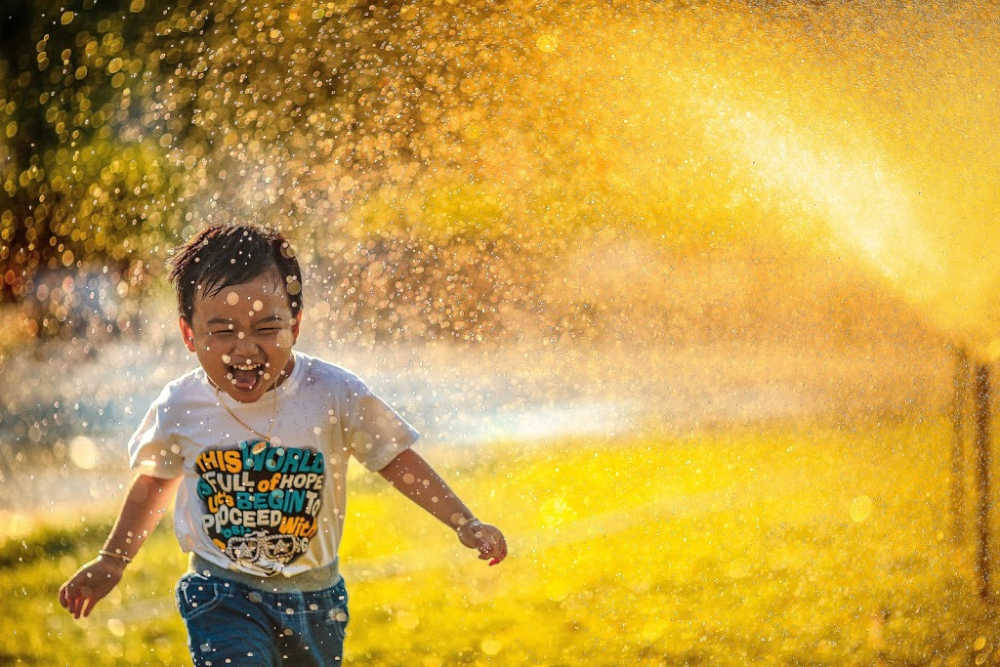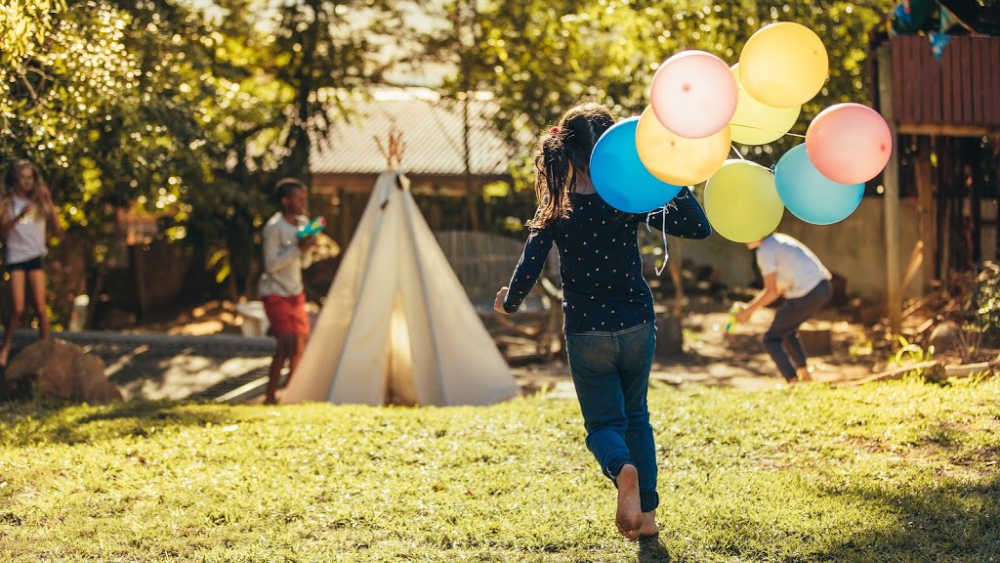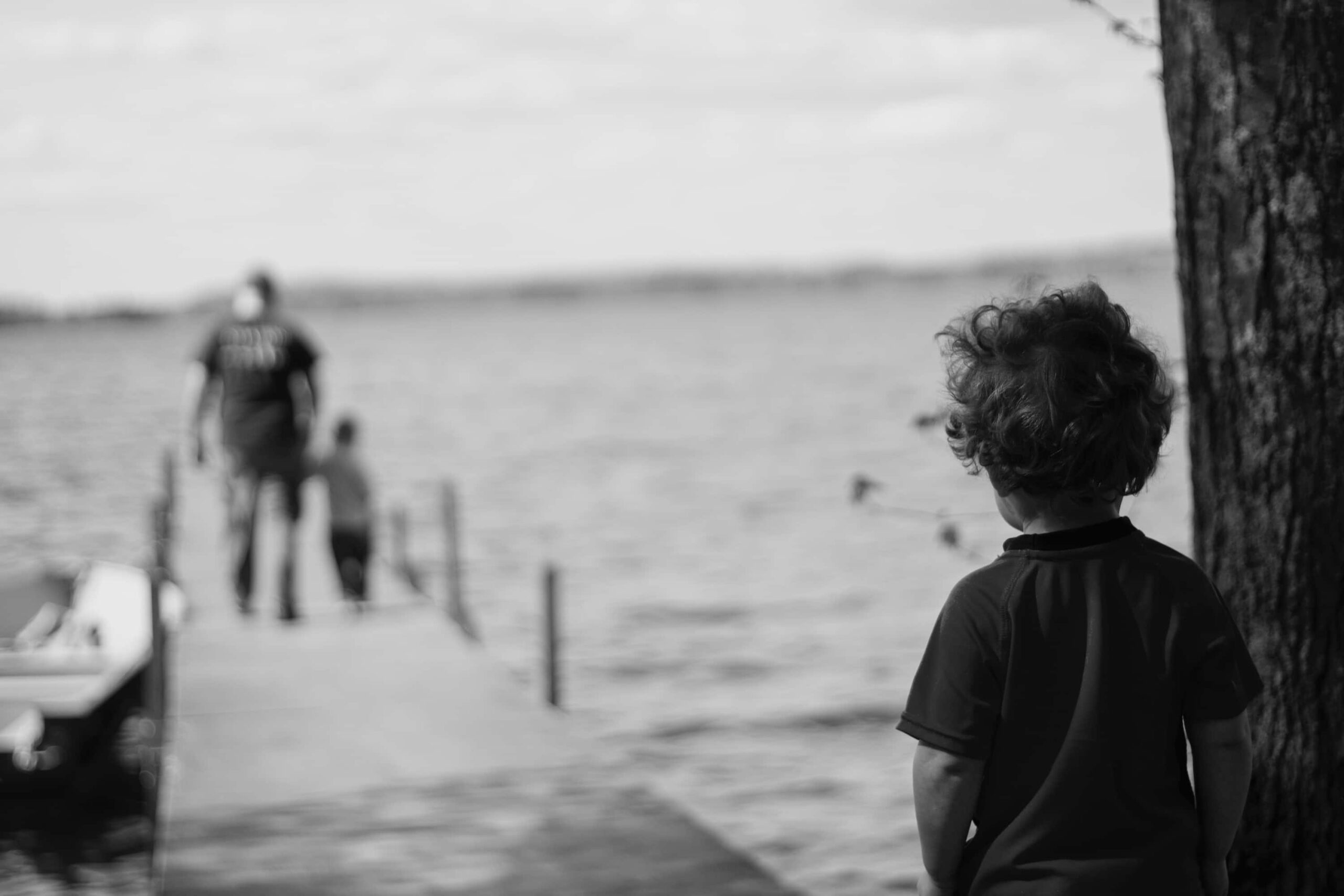Table of Contents
- Fast forward to today and I have a very different take on summertime with my own kids.
- Research supports these observations.
- Based on this, what should parents do?
- Summer activities for kids that involve your presence
- Summer activities for kids that foster independence
- Summer activities for kids that promote creativity.
- A final note on giving children the best summer ever
When it comes to summer activities for kids, you don’t need to plan or spend too much. In fact, the way to give your child the best summer possible is incredibly simple. Find out how below.
One of the highlights of my summers growing up were back-to-back sleepovers with my best friend, Meghan.
Her parents are my Godparents and my parents are hers. And so there were times that we were allowed to alternate nights sleeping at her house and mine. We woke up and spent our days pretending her parents’ abandoned barn housed our imaginary horses, nursing a hurt robin back to life, or wading through the murky pond behind my parents’ house in search of frogs.
At night, we would lay down in my brother’s bunkbeds or her games-room. Then, we counted the seconds between the sound of thunder and the strike of lightning or got in trouble for playing Sonic the Hedgehog when we should have been sleeping.
Those days and nights blurred into one each other. There was no schedule and therefore no way to keep time. Summer seemed to go on forever and it was the best.
Fast forward to today and I have a very different take on summertime with my own kids.
Instead of the days seeming endless, I am ever-aware of the finite nature of my children’s childhoods. Whenever I see the article, 18 Summers: It’s All We Get, it makes my heart skip a beat because the truth is that I don’t exactly have 18 summers.
With a 7, 6, and 2-year-old, I only have 11, 10, and 16 summers left. And, in truth, as they get into their teenagehood, my time with them will become fewer and further between.
It hurts my heart.
All I want to do is cling to my children’s childhood for dear life and soak in as many memories with them as possible.
Though time is a cruel thief, time isn’t the most imminent threat to my children’s childhoods. It is, in fact, societal pressure to be more, have more and do more.
The type of summer Meghan and I shared is now rare. Instead of engaging in elaborate imaginative play, spending time in nature, and enjoying days that are undefined, many children spend summertime overscheduled in too many extracurricular activities or in camps and in front of screens for far too long.
Instead of allowing children to develop in the way that nature intended them to, largely through free play, we expect them to live in adult-like schedules and learn in adult-like ways.
For the immature human brain, we are asking far too much (1). – Alana Pace
Case and point, family therapist, Kim John Payne found that children in his practice were overscheduled and overstimulated. He found it was to the point that the patients he saw were exhibiting comparable stress levels to children in wartorn countries. Though they are physically safe, mentally speaking they aren’t. Payne observed western children showed compounding stress. The more children spend time in front of screens, in extracurricular activities, and overrun by toys, the more they feel overwhelmed. And, as stress levels climb, children then are more likely to experience symptoms of anxiety, depression, and other disorders.
Related reading: There is an undeclared war on childhood. This is how we stop it.
Research supports these observations.
Metanalyses of mental illness among young people show that the youth of today are 500% more likely to experience depression, anxiety, paranoia or psychosis than previous generations (2). The most drastic increase has been from the 1990s until the present. Researchers feel this is largely due to a disproportionate focus on individualism. Notably, the more youth are focused on personal achievement and the appearance of perfection, the more likely they are to experience mood disorders (4).
Adding to this mental illness epidemic is a lack of outdoor play.
The reason?
Active outdoor play is positively associated with better behaviour and mental health (5). Sadly, our children are spending less time outside than we did. A study conducted by National Trust found that children our generation spent an average of eight hours a week outside while our children spend about four (6). In turn, a study by Seattle Children’s Research Institute found that only 40 percent of mothers and 24 percent of fathers took their children outside each day (7). And approximately half of the children weren’t going outside regularly at all.
Based on this, what should parents do?
Here are 3 golden rules to combat these negative influences and giving our kids the best summer ever.
- Get present. Turn off smart devices and say no unnecessary plans. When it comes to organized summer activities for kids or work and social commitments for you, say no to the superfluous. For example, if your child is desperate to go to musical theatre camp and it’s within your means, go for it. Otherwise, say no to the extras. Then, join in their ideas for fun.
- Give your child new opportunities to feel independent (and therefore confident). Some of the best childhood memories happen when children have the freedom to explore on their own. For instance, being allowed to bake on my own, heading to the corner store with friends, or playing outside unsupervised until the sun started to set are some of the highlights from when I was young.
- Promote creativity. Pretend play is where the magic of childhood happens. And, even though boredom may seem like a problem to be solved, it actually can be the precursor to inventiveness. Furthermore, studies find that young children who engage in more pretend tend to be more creative later in life.
Below are several summer activities for kids that elaborate on these three guiding principles to give children the best summer ever.
Summer activities for kids that involve your presence
In order to give your child the best summer ever, you will want to get present often. In order to do this, you will need to unplug from your phone and work commitments as often as possible. Say no to extra activities or anything that unnecessarily imposes a schedule on yours and your children’s lives.
Instead, try some any of these 12 prompts to get present and give your child the best summer possible.
- Pack lunches, snacks, and sunscreen and head to a waterpark or splash pad for the day. Stay as long as your kids would like
- Run and jump in the sprinkler or slide down the slip and slide with them.
- Pack a picnic for when you pick them up from daycare and head to the nearest lake for dinner.
- Plan movie nights, pop popcorn and watch whatever show they choose.
- Go to the local library and binge on books. Then, read to them as often as they’d like (even if they’re old enough to read on their own).
- Spend the day at an outdoor pool.
- Head to the beach and wade through tide pools looking for marine life. Or, head to a local creek and look for minnows, crayfish and other freshwater creatures.
- Lounge in your backyard often. Bring out books, toys, or paint rocks. Or forget an activity altogether and simply enjoy how lovely it is to be present in the outdoors.
- Pack snacks and go on kid-friendly hikes along rivers and creeks you might be able to dip your feet into along the way.
- Try geocaching.
- Allow your child to look up a recipe and make it together. Let your kids lick the bowl if they want to!
- Ride bikes to the closest store or ice cream shop and let them load up on sugar.
Summer activities for kids that foster independence
Some of the greatest predictors of success are resilience and ability to problem-solve. Over-protected and over-managed children tend to have poorer confidence and feel overwhelmed more easily. However, children who are given chances to feel competent on their own and have age-appropriate responsibility do better in life (8).
One of the best ways to give your child the best summer is to provide freedom. Here are six great prompts to do so.
- Establish clear safety rules while being open to discussion about new ideas your child has that involve more responsibility and/or less supervision.
- When you go to the park, sit on the sidelines and watch your child introduce herself to others, try out the monkey bars, or create her own game with new friends.
- Say yes to something your child has not done before. For a younger child, this could be walking to her friend’s house down the street without you accompanying her. Or, you could let him being able to play in the front yard without you outside the whole time. For an older child, this may be going to the neighbourhood park with his friends without you or riding her bike to the corner store (if age appropriate and relatively safe). Or maybe making dinner for the family for the first time.
- Give your child space when he has friends over. If the friend’s parent stays, head to a different room to allow the children the opportunity to negotiate rules, settle arguments and be creative without adult interference.
- Allow your child to plan an outing for the family. It could be a day trip or something simple like heading to a nearby splash pad.
- Encourage older children to take on meal preparation and cleaning up afterwards. For example, have your six-year-old make his own lunch throughout the summer or your eight-year-old make one dinner a week for the family.
- Let your child play outside with minimal or no supervision based on what’s age-appropriate and reasonably safe.
Summer activities for kids that promote creativity.
Free-play is the antidote to so many problems are children are facing today. And creative or pretend play are great ways to also promote problem-solving, encourage imagination, and encourage inventiveness.
I always preface these activities by informing my kids that they can be creative as they would like. However, they must clean up everything once they are done (or my answer won’t be yes the next time they want to do something like this).
Here are 9 amazing summer activities to promote creativity
- Make a “magic” potion with pantry ingredients, items from your craft cupboard, or items found on a nature walk.
- Say yes to one of your child’s crazy ideas as long as it’s feasible and, of course, safe.
- Allow your children the opportunity to re-arrange the furniture, empty out the linen closet and make a fort.
- Get out the recycling, some tempera paint, glue and tape and prompt your children to create whatever comes to mind.
- Set up sensory play activities. Something as simple as water with toys, soap foam, or coloured cloud dough plus your child’s favourite toys will procure all the benefits of sensory play.
- Be okay with them getting dirty as they create mud pies, build sand castles or make a messy craft.
- Let them explore the craft cupboard or go to the dollar store and help them create their own vision rather than a Pinterest-perfect idea.
- Encourage them to set up fun backyard activities and invite their friends over for a day worth of play. My kids have set up a “fair” using all of our sporting equipment as stations. We also love spraying down the driveway and writing with sidewalk chalk (it’s so vibrant) or making chalk paint.
- Take out toys your children haven’t played with in a while and watch old become new again!
A final note on giving children the best summer ever
As my son’s birthday, and the end of the school year, approached this year, everything in me told me to organize, to create Pinterest-worthy games and plan out a picture perfect craft for each of the boys to take home. But with the memory of Meghan’s and my summers impressed upon me, I held back. I texted all of the parents who had RSVPed and said, “We will spend the whole party in our backyard. Please make sure the kids are dressed for the weather.”
My son’s birthday came and I looked at the party setup. I felt like it was alarmingly bear by my standards.
I called out to my two big kids to pull out the soccer net, some balls and any other outdoor stuff they wanted to play with. As the parents came to drop off their kids, I resisted the urge to apologize for my lack of orchestration. To my surprise, the parents seemed impressed.
My nervousness that the boys and girls would get bored dissipated as the children ran, squealed, and played. The party’s scheduled end came, but the parents returned seeing how well everyone was playing, they stayed for hours afterwards. Everything felt connected as the adults chatted and the children slowly opened and played with my son’s gifts.
It was one of the first times in ages that I felt like time went on longer than usual. And it was in the best way possible.
More great articles like these:
What to do outside on a rainy day with kids
There is an undeclared war on childhood. This is how we stop it.
50 Ways to Play: Your Family’s Ultimate Summer Bucketlist
Extracurricular activities for kids: Scientists say this is the best approach.
Why children benefit from more outdoor play.
Simple Olympic Activities for Preschoolers
Make your kiddie pool awesome with these sensory play ideas.














So true so wise
Enjoy your delightful kids